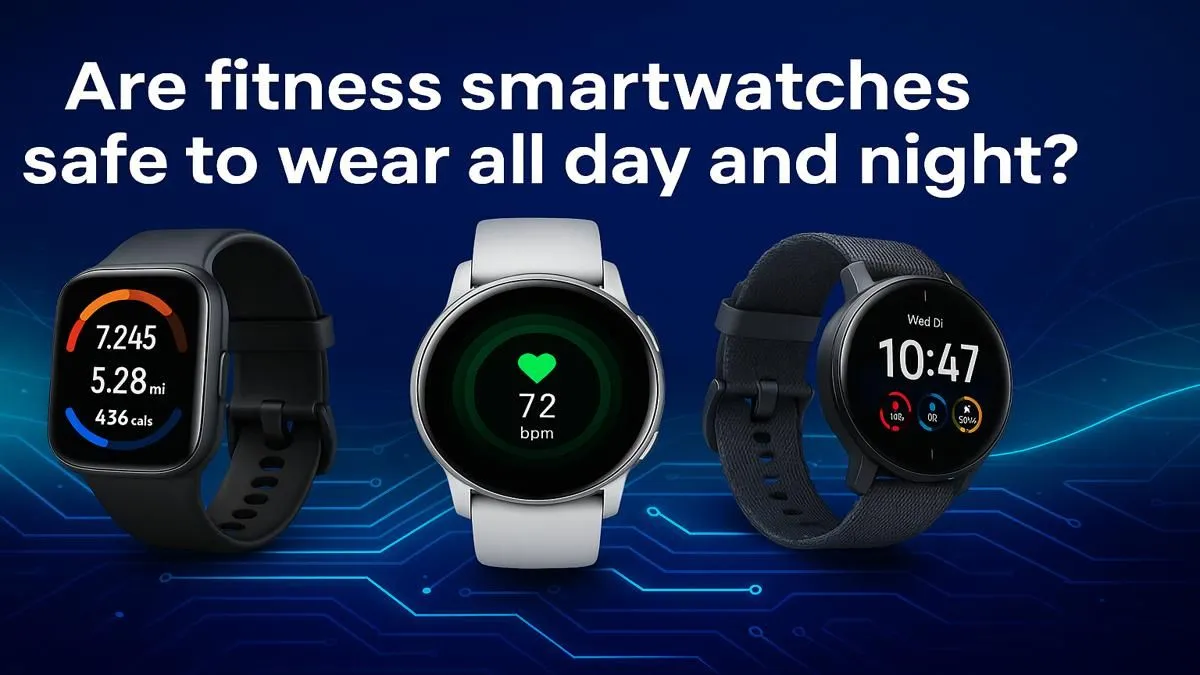
Cable Anchor Noise Fix for Ultralight Gaming Mouse
✦ Eliminate ultralight gaming mouse cable anchor noise. ✔️Simple fixes for smoother, quieter gameplay. Don't let noise distract—boost your gaming.
Curious if fitness smartwatches are safe to wear 24/7? 😲 Discover potential health risks, safety guidelines & tips to protect your skin 👨💻

Fitness smartwatches are everywhere, tracking our steps, sleep, and heart rates. But with any tech we wear 24/7, questions about safety are bound to come up. Is the radiation a risk? How secure is your personal health data? We're diving into the most common concerns South Africans have about their wearable tech, separating the facts from the fiction so you can wear your device with confidence. Let's get into it. 🤔
Q: Do smartwatches emit harmful radiation? A: This is a top concern, but the science is reassuring. Smartwatches use low-power, non-ionizing radiofrequency (RF) energy for Bluetooth and Wi-Fi—the same type used by your smartphone. According to major health organisations worldwide, this level of exposure is not considered harmful to humans. The power output is significantly lower than that of a phone held to your ear, making the risk negligible.
Q: Is my personal health data kept private and secure? A: Reputable manufacturers take data security very seriously. Your health information is typically encrypted both on the device and during transfer to your phone. However, you play a key role. Always use a strong, unique password for your account, review the brand's privacy policy, and be mindful of the permissions you grant to third-party apps. When you browse for a smartwatch, consider brands known for their robust security features.
Q: Can wearing a smartwatch all the time cause skin irritation? A: It can, but it's usually preventable. Most irritation comes from trapped sweat and bacteria, not the device itself. The solution? Keep it clean and don't wear it too tight. Most straps are made from hypoallergenic materials like silicone or nylon. If you have sensitive skin or a known nickel allergy, look for devices with stainless steel or titanium casings. Some brands, like the popular Promate smartwatches, offer a variety of strap materials to choose from.
Give your wrist a break. Take your watch off for 15-20 minutes after a sweaty workout or when you shower. Make sure both your wrist and the watch are completely dry before putting it back on.
Q: How accurate are the health sensors, really? A: Fitness-grade smartwatches are excellent for tracking trends and motivating healthy habits. However, they are not medical devices. While heart rate and blood oxygen (SpO2) sensors have become incredibly advanced, their readings should be seen as wellness estimates. For any medical concerns or diagnoses, always consult with a healthcare professional.
Q: Are there any actual safety benefits to wearing a smartwatch? A: Absolutely! This is where smartwatches truly shine. Many of the latest smartwatches come equipped with features like automatic fall detection, which can alert emergency contacts if you take a hard fall and are unresponsive. Emergency SOS functions and high/low heart rate notifications also provide a powerful layer of personal safety, whether you're out on a run or just home alone. 🛡️
Q: Is it safe to sleep with my smartwatch on? A: Yes, it is safe. Smartwatches are designed for 24/7 wear, and tracking your sleep is one of their core functions. The RF exposure is minimal and consistent with safety standards. The biggest "risk" is simply having your sleep disturbed by notifications, so be sure to enable 'Sleep Mode' or 'Do Not Disturb' to ensure a peaceful night's rest.
Find Your Safe and Secure Fitness Partner Ready to track your health with peace of mind? Evetech offers a huge selection of trusted and feature-rich wearables to match your lifestyle. Browse our complete collection of smartwatches and take the next step in your wellness journey today.
Prolonged wear may lead to irritation, rashes, or acne due to friction, sweat buildup, or allergic reactions to materials. Rotate wrist placement or clean regularly to reduce these smartwatch skin irritation risks.
Smartwatches emit low-level electromagnetic fields (EMF). While generally safe, limit prolonged direct contact with your skin to reduce exposure. Check smartwatch EMF exposure guidelines from health authorities.
Sleep tracking is helpful, but wearing a smartwatch at night may disrupt sleep quality. Electromagnetic fields and light exposure might interfere with circadian rhythms. Use airplane mode or opt for sleep-specific trackers for safer continuous smartwatch monitoring.
Clean your wrist and device daily. Ensure proper ventilation between the band and your skin, and loosen the strap at night. These fitness tracker safety tips can help avoid smartwatches and health risks.
If you have sensitive skin, opt for hypoallergenic bands (like nylon or titanium), adjust wear periods, and maintain good hygiene. These best practices for smartwatches help reduce allergic reactions linked to wear smartwatch 24 hours.
Smartwatches encourage physical activity, monitor heart rate, track sleep patterns, and offer emergency features. For optimal smartwatch health effects, use them as intended and avoid unnecessary all-day smartwatch wear.
Constant wear usually improves accuracy, but skin irritation or tight bands can hinder sensor readings. Ensure proper fit and allow skin breaks to maintain reliable results from continuous smartwatch monitoring.